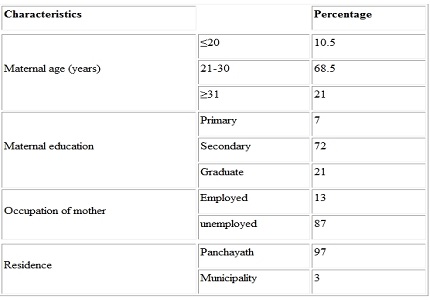Knowledge, attitude, and practice of breast feeding mothers in a tertiary care centre: a descriptive study
Abstract
Objective: Child feeding practices, including breastfeeding, affects the nutritional status of children under two years of age. Maternal knowledge and comfort of breastfeeding are factors that predict the feeding outcomes. The current study was designed to assess the knowledge, attitude, and practice regarding breastfeeding of mothers attending the outpatient department and Immunization clinic of a tertiary center in Kerala.
Methods: This descriptive, cross-sectional study was conducted from August 2015 to October 2015. The study subjects included all eligible mothers with infants between 6 months to 1 year of age visiting the outpatient department and immunization clinic during the study period.
Results: All participants had knowledge that child should be breastfed, but only 73% had knowledge about exclusive breastfeeding. In this study, more than half of the participants (62.5%) initiated breastfeeding within one hour of delivery. Only one-third of the participants practiced exclusive breastfeeding for more than 6 months.
Conclusion: The present study shows that breastfeeding behavior among the study population is still far from optimal.
Downloads
References
2. Gupta A, Arora V, Bhatt B. The State of World’s Breastfeeding: India Report card 2006. International Baby Food Action Network (IBFAN), Asia Pacific. India. 2006.
3. CARE. Infant and Young Child Feeding Practices: Collecting and Using Data: A Step-by-Step Guide: Cooperative for Assistance and Relief Everywhere, Inc. [CARE]; 2010.
4. Rasania SK, Singh SK, Pathi S, Bhalla S, Sachdev TR. Breast-Feeding Practices in A Maternal and Child Health Centre In Delhi. Health PopulPerspect Issues. 2003;26:110–5. Available at: http://medind.nic.in/hab/t03/i3/habt03i3p110.pdf Accessed: 3rdDecember, 2017.
5. Dadhich JP, Gupta A. Assessment of Status of Infant and Young Child Feeding (IYCF) practice, policy and program-Achievements and Gaps. Breastfeedingpro-motion network of India. 2005.
6. Government of India. National fact sheet India: 2015‑2016 National family health survey (NFHS‑3). State Fact Sheet, Kerala. New Delhi: Ministry of health and family Welfare, Govt.of India [Internet]; 2016. Available from: http://rchiips.org/nfhs/ [cited 2017 Oct 24].
7. Chaudhary R N, Shah T, and Raja S. Knowledge and practice of mothers regarding breastfeeding: a hospital based study. Health Renaissance. 2011; 9(3):194-200. doi: http://dx.doi.org/10.3126/hren.v9i3.5590.
8. Shaili V, Parul S, Kandpal S D, Jayanti S, Anurag S, Vipul N. A community based study on breastfeeding practices in rural areas of Uttarakhand. National Journal of Community Medicine. 2012; 3(2): 283-287.
9. Hiremath B R, Sorganvi V. A Cross-Sectional Study On Breastfeeding Practices In A Rural Area Of North Karnataka. IJCRR. 2013; 5(21): 13-18.
10. Vijayalakshmi P, Susheela T, Mythili D. Knowledge, attitudes, and breastfeeding practices of postnatal mothers: A cross sectional survey. Int J Health Sci (Qassim). 2015 Oct;
9(4): 364–374.PMCID: PMC4682591.
11. Shashank K J and Chethan TK. A study of breastfeeding practices among mothers in rural area of Mangalore district: A cross-sectional study. National Journal of Community Medicine. 2016;7(2):134-137. pISSN 0976 3325.
12. Chattopadhyay ND, Chakraborty S, Dasgupta A. Infant and young child feeding practices among mothers in a rural area of West Bengal, India. Annals of Medical and Health Sciences Research. 2013; 3(3): 370-375.
13. Tiwari R, Mahajan PC, Lahariya C. The determinants of exclusive breast feeding in urban slums: a community based study. J Trop Pediatr. 2009 Feb;55(1):49-54. doi: 10.1093/tropej/fmn037. Epub 2008 May 22. [PubMed]
14. Bandyopadhyay M. Impact of ritualpollution on lactation and breastfeedingpractices in ruralWestBengal, India. Int Breastfeed J.2009Mar26;4:2. doi: 10.1186/1746-4358-4-2. [PubMed]
15. Ulak M, Chandyo RK, Mellander L, Shrestha PS, Strand TA. Infant feeding practices in Bhaktapur, Nepal: a cross-sectional, health facility based survey. Int Breastfeed J. 2012 Jan 10; 7(1):1. doi: 10.1186/1746-4358-7-1.
16. Madhu K, Chowdary S, Masthi R. Breast feeding practices and newborn care in rural areas: a descriptive cross-sectional study. Indian J Community Med. 2009 Jul;34(3):243-6. doi: 10.4103/0970-0218.55292. [PubMed]
17. Oche MO, Umar AS, Ahmed H. Knowledge and practice of exclusive breastfeeding in Kware, Nigeria. Afr Health Sci. 2011 Sep;11(3):518-23. [PubMed]
18. Ekanem IA, Ekanem AP, Asuquo A, Eyo VO. Attitude of working mothers to exclusive breastfeeding in Calabar municipality, cross river State, Nigeria. Journal of Food Research. 2012;1:71–75. Doi: 10.5539/jfr.v1n2p71.
19. World Health Organization, UNICEF. Ten steps to promote successful breastfeeding. Protecting, promotingand supporting breast‑feeding: The special role of maternity services. Geneva: Mother and Child Division; 1989. p. iv.
20. Agarwal S, Srivastava K, Sethi V. Maternal and New-born Care Practices Among the Urban Poor in Indore, India: Gaps, Reasons and Possible Program Options. Urban Health Resource Center; New Delhi: 2007.
21. Otsuka K, Dennis CL, Tatsuoka H, Jimba M. The relationship between breastfeeding self-efficacy and perceived insufficient milk among Japanese mothers. J ObstetGynecol Neonatal Nurs. 2008 Sep-Oct;37(5):546-55. doi: 10.1111/j.1552-6909.2008.00277.x.
22. Imdad A, Yakoob MY, Bhutta ZA. Effect of breastfeeding promotion interventions on breastfeeding rates, with special focus on developing countries. BMC Public Health. 2011 Apr 13;11 Suppl3:S24. doi: 10.1186/1471-2458-11-S3-S24.
23. Dubois L, Girard M. Social determinants of initiation, duration and exclusivity of breastfeeding at the population level: the results of the Longitudinal Study of Child Development in Quebec (ELDEQ 1998-2002). Can J Public Health. 2003 Jul-Aug;94(4):300-5.
24. Khassawneh M, Khader Y, Amarin Z, Alkafajei A. Knowledge, attitude and practice of breastfeeding in the north of Jordan: a cross-sectional study. Int Breastfeed J. 2006 Sep 23;1:17. [PubMed]
25. Hurley KM, Black MM, Papas MA, Quigg AM. Variation in breastfeeding behaviours, perceptions, and experiences by race/ethnicity among a low-income statewide sample of Special Supplemental Nutrition Program for Women, Infants, and Children (WIC) participants in the United States. Matern Child Nutr. 2008 Apr;4(2):95-105. doi: 10.1111/j.1740-8709.2007.00105.x.

Copyright (c) 2017 Author (s). Published by Siddharth Health Research and Social Welfare Society

This work is licensed under a Creative Commons Attribution 4.0 International License.


 OAI - Open Archives Initiative
OAI - Open Archives Initiative


